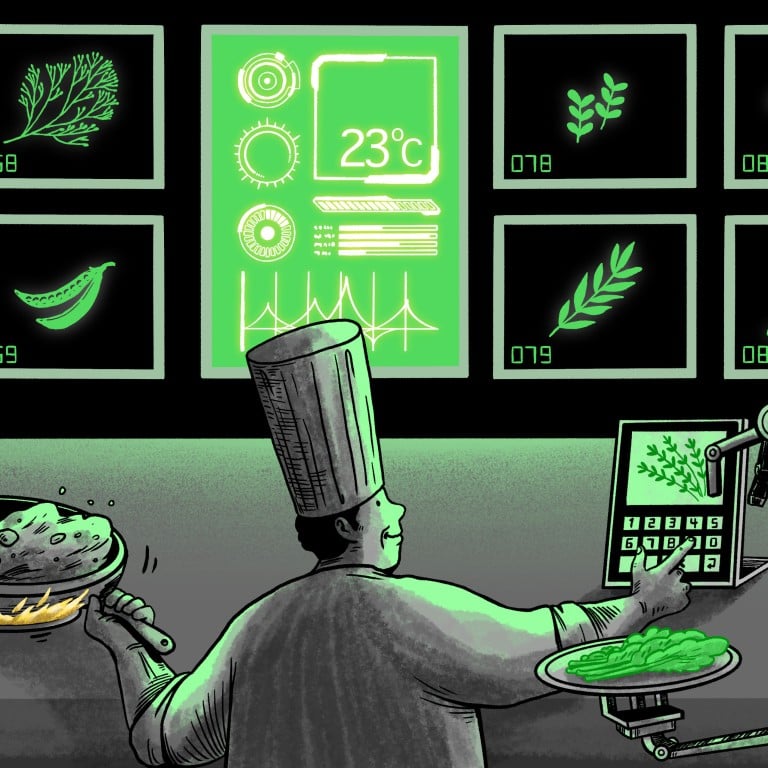
Can technology improve Hong Kong food safety? From liquid eggs to urban farming, manufacturers turn to innovation as consumers demand transparency
- Government subsidies help food and drink businesses invest in efficient automated production lines that allow greater control over contamination risks
- Consumers want better information about where food and drink products come from and how safe they are
Hong Kong urban farmer Raymond Mak Ka-chun does not grow vegetables at his hi-tech enterprise at the Tseung Kwan O InnoPark.
Instead, he helps supermarkets and restaurants grow their choice of herbs and leafy greens using a fridge-sized device on wheels that his company developed.
“By having freedom to decide what to grow and when to eat, they ensure the produce they use is the freshest, while preventing wastage and spoilage,” said Mak, CEO of Farmacy, Hong Kong’s first decentralised urban farming technology company founded in 2018.
Mak, 40, is among entrepreneurs in the food and beverage manufacturing sector who have embraced tech and automation at a time when consumers are demanding better information about the origin and safety of products.
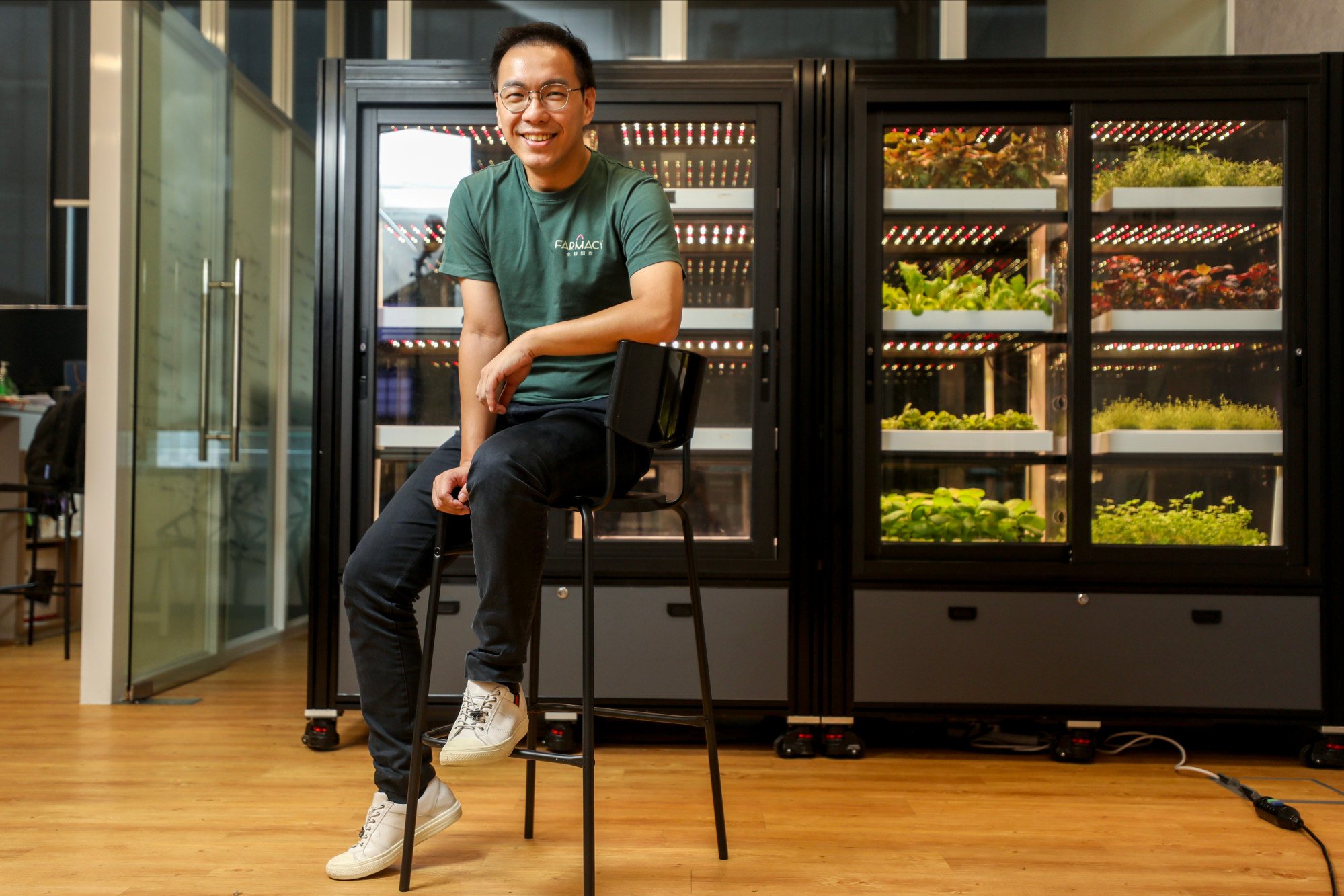
His two-by-1.4-metre device for automated vertical farming has a system that ensures optimal levels of water, nutrients, light, temperature and other factors to grow 200 stems of greens at any one time.
Clients buy seeds from the company for 3,500 to 4,000 stems a year, taking four to six weeks to harvest greens such as kale and lettuce, or herbs like basil and rosemary, and seven to 10 days for microgreens like mustard and wheat grass.
His clients include the CitySuper, Yata, Fusion and Market Place supermarkets, Italian restaurant Interval and the five-star hotel Le Meridien at Cyberport.
Le Meridien said it served the fresh herbs and microgreens picked fresh daily and was actively promoting the farm-to-table dining concept to guests.
One dish made with its own produce was a home-grown garden cress salad featuring assorted microgreens, herbs, roasted cherry tomatoes, grapes and radish.
High-rise farms in Hong Kong: computers and drones – no shovels
Vegetables grown from indoor hydroponic vertical farms were relatively safe to eat, said Dr Fong Lai-ying, director of the Hong Kong Food Innovation and Technology Centre and a member of the government’s expert committee on food safety.
“The source of irrigation water is carefully selected without soil contaminants in a controlled indoor environment, which minimises the risk of food contamination,” she said.
“It’s one of the benefits of adopting tech in food manufacturing and the trend of the future.”
Milk made in Hong Kong? University rolls out only drink of its kind in city
Mak took some years to turn his hi-tech food idea into reality.
A 2005 psychology and philosophy graduate of the University of Hong Kong (HKU), he worked in consulting companies for five years before joining global advisory firm PwC as a strategy consultant in corporate restructuring.
He struck on his farm-to-table business idea while on a volunteer trip with the company to a village near the Dongjiang, or East River, in Guangdong in 2012.
“The villagers were poor and hosted us to dinner without serving meat, but the vegetables they grew just outside the door were the best vegetables I’d ever had,” he recalled. “That was something I really wanted to bring to Hong Kong, to minimise the distance between people and the fields.”
Before becoming an urban farmer however, he completed a Master of Business Administration degree at HKU, then tried but failed to be elected to the Legislative Council in 2016.
‘It’s such a privilege to grow food’: how urban farmer found her mission
It was not until 2018 that he set up Farmacy with some of his MBA classmates and friends with backgrounds in innovation and technology, biotech, mechanical engineering and nutrition.
The team had to study growth cycles, cultivation methods and associated technologies, learning by trial and error as it developed the optimal conditions to grow different kinds of plants.
He said plants cultivated this way had 70 per cent lower carbon emissions than soil-based crops because of the reduced transport time, and were also pesticide-free.
Because the greens and herbs were grown on site and harvested only when needed, there was less of the nutritional degradation that occurred when plants had to be packaged and transported, he said.
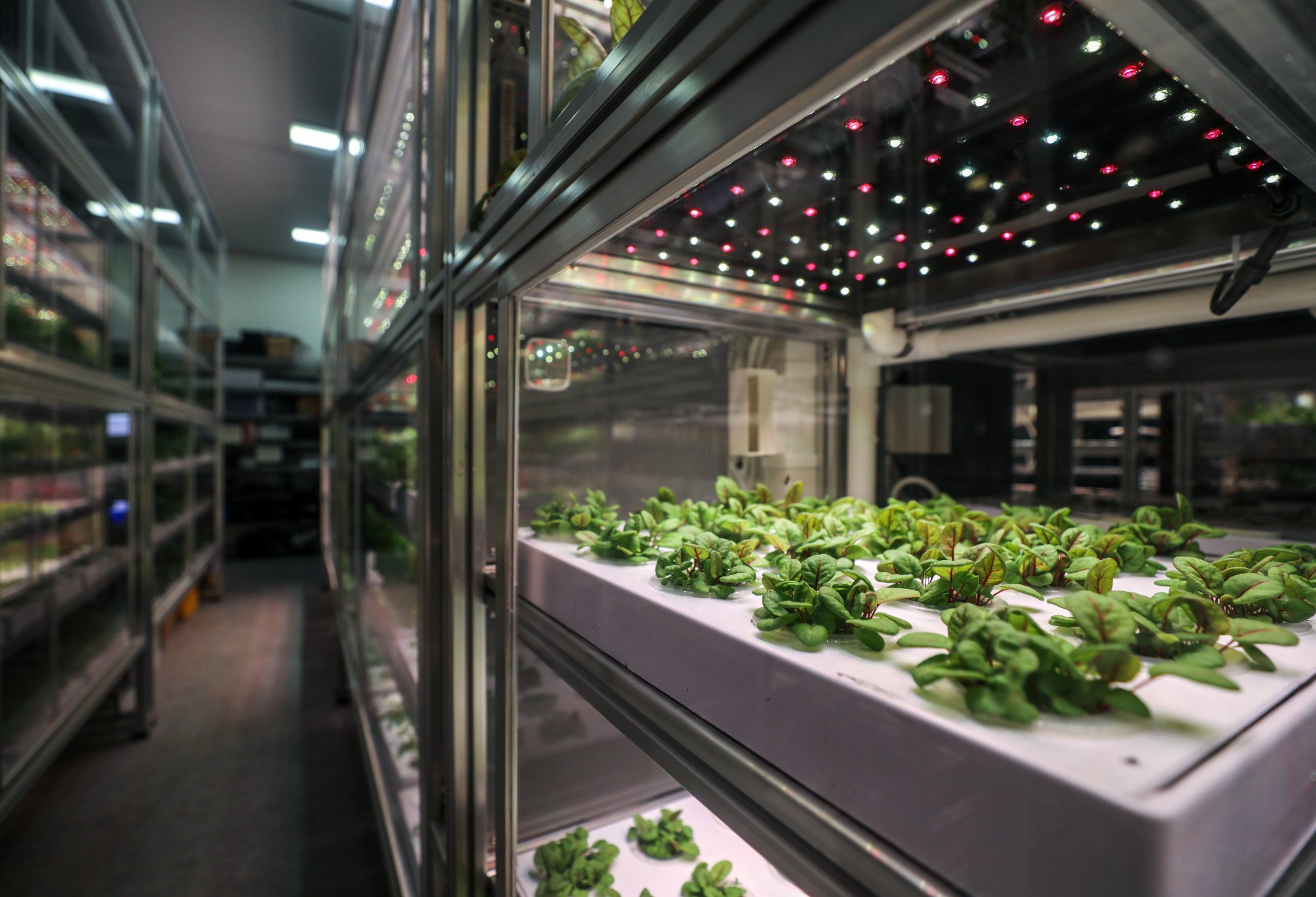
Through the Re-industrialisation Funding Scheme under the Innovation and Technology Commission, the government offers matching subsidies, contributing half as much of the investment made by companies to establish smart production lines.
Since 2020, a vetting committee has approved 34 applications for food manufacturing and processing, and biotech and health products with a total funding of about HK$260 million (US$33.2 million) as of August.
Michael Young Kam-yim received HK$14.9 million two years ago to build a smart production line for Luen Tai Hong, Hong Kong’s only supplier of fresh liquid eggs. Second-generation owner Young is managing director of the company.
Farmers worry Northern Metropolis plan leaves them out in the cold
He wanted to streamline processes and the use of labour at his four-storey base in Tai Po InnoPark.
“Running the production line eight hours a day allows us to process more than 1 million eggs a day with the new production line,” said Young, adding that the change also meant he could train his workers to switch from labour-intensive tasks to handling the new technological aspects of the business.
Founded in 1957 by Young’s father, the company began as a wholesaler importing eggs from Southeast Asia and mainland China.
Joining the business in 1981, he proposed preserving and sun-drying salted egg yolks, which became a favourite among fishermen and gained popularity.
The company eventually became known for selling egg whites and yolks separately.
In 1999, he started selling egg whites to bakeries and yolks to noodle makers, but the job had to be done by hand and a single worker could handle no more than 360 eggs in an hour.
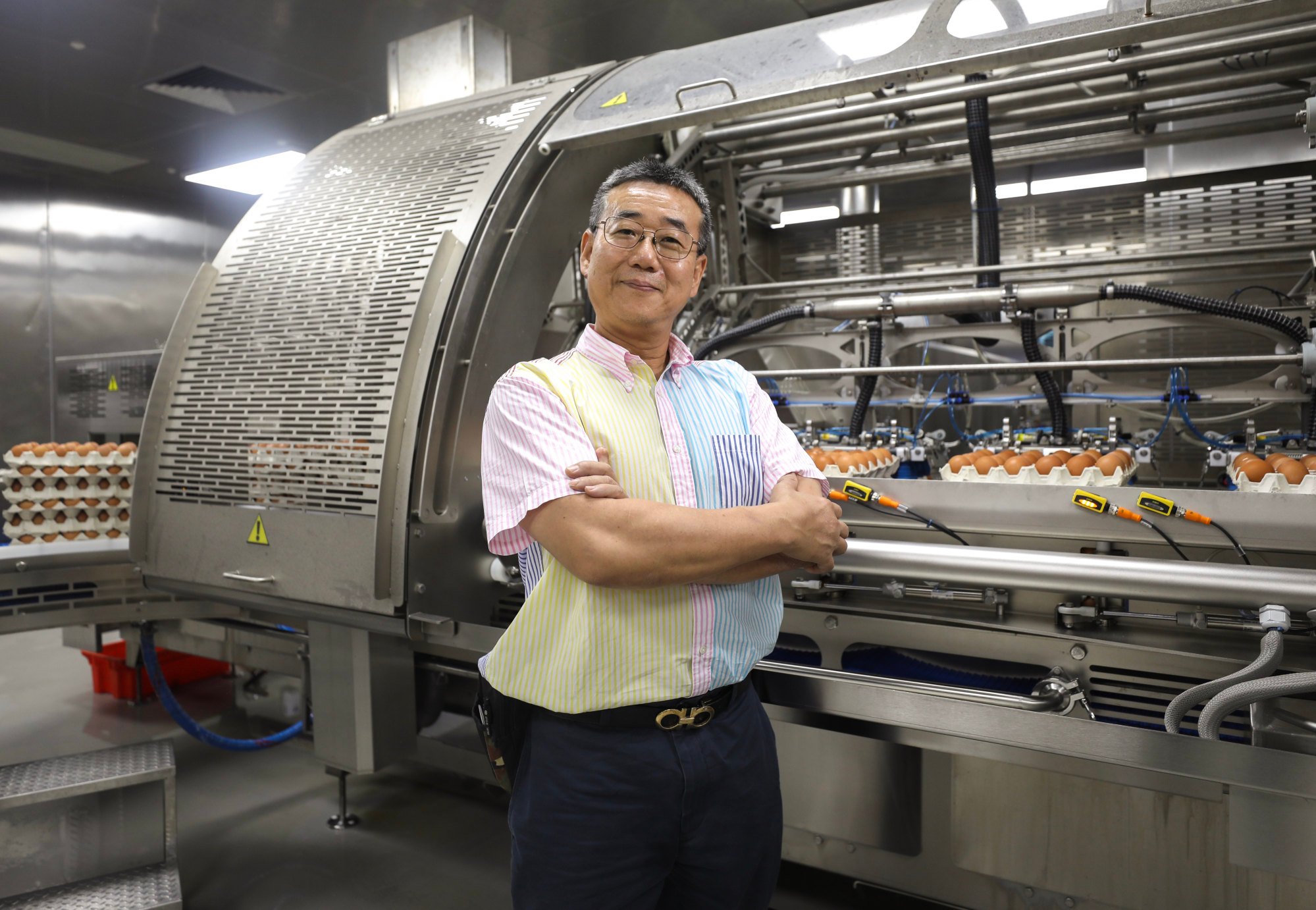
Competition from mainland companies in the early 2000s spurred him to bring in a comprehensive production line from Europe that was able to process 45,000 eggs per hour hygienically, using less labour.
That led to the company specialising in liquid egg production, with a pack of pasteurised liquid yolks now selling at HK$300 for 5kg (661lbs), with the whites going for HK$260.
At the plant, eggs are conveyed by robotic arm to a washing and sterilisation process, before being air-dried under high-pressure and sent into an automatic egg separation machine.
Sensors and cameras help to ensure the whites and yolks are separated properly, without wastage, before they are cooled, pasteurised and packaged automatically.
The liquid egg products go to eateries, bakeries and airline catering services.
How Hong Kong’s new food rescue apps are bringing creative ideas to the table
Young said the equipment used was equipped with Internet of Things (IoT) technology, which enabled a network of interconnected devices, appliances embedded with sensors and software for collecting and exchanging data and quick detection of anomalies during production.
“Every batch can be traced because of the data,” he said, adding that the system tracked scheduling for orders, predicted equipment failure and maintenance needs, reducing production line downtime and repair costs.
Food expert Fong said the most crucial part of Luen Tai Hong’s manufacturing process was cleaning the eggs before they were broken and separated.
Automating the process of washing and disinfecting the eggs significantly reduced the risk of cholera and salmonella which could occur if chicken faeces and feathers entered the production line.
“The liquid eggs need to be pasteurised before packaging and that gives the products a longer shelf life,” she said.
Over at Transform, a Hong Kong-based drinks manufacturer specialising in alkaline drinking water boosted by plant-based minerals, managing director Albert Lok Kin-man said he valued safety most.
Hongkongers to buy less Japanese food, avoid country over waste water plan: poll
He went into bottling water after his daughter, born in 2009, suffered chronic constipation. His research took him to Malaysia where he found alkaline drinking water infused with plant-based minerals which helped his baby.
“I visited many exhibitions after that and ended up starting my company in Hong Kong in 2014,” he recalled.
Currently producing 22,000 bottles of water a day, Lok is aiming for a fivefold increase in output after his smart production line is ready by the end of the year.
“The IoT technology allows us to switch our manpower to work on our system and maintain the consistency in our products. With real-time monitoring, we can stop when something goes wrong,” he said.
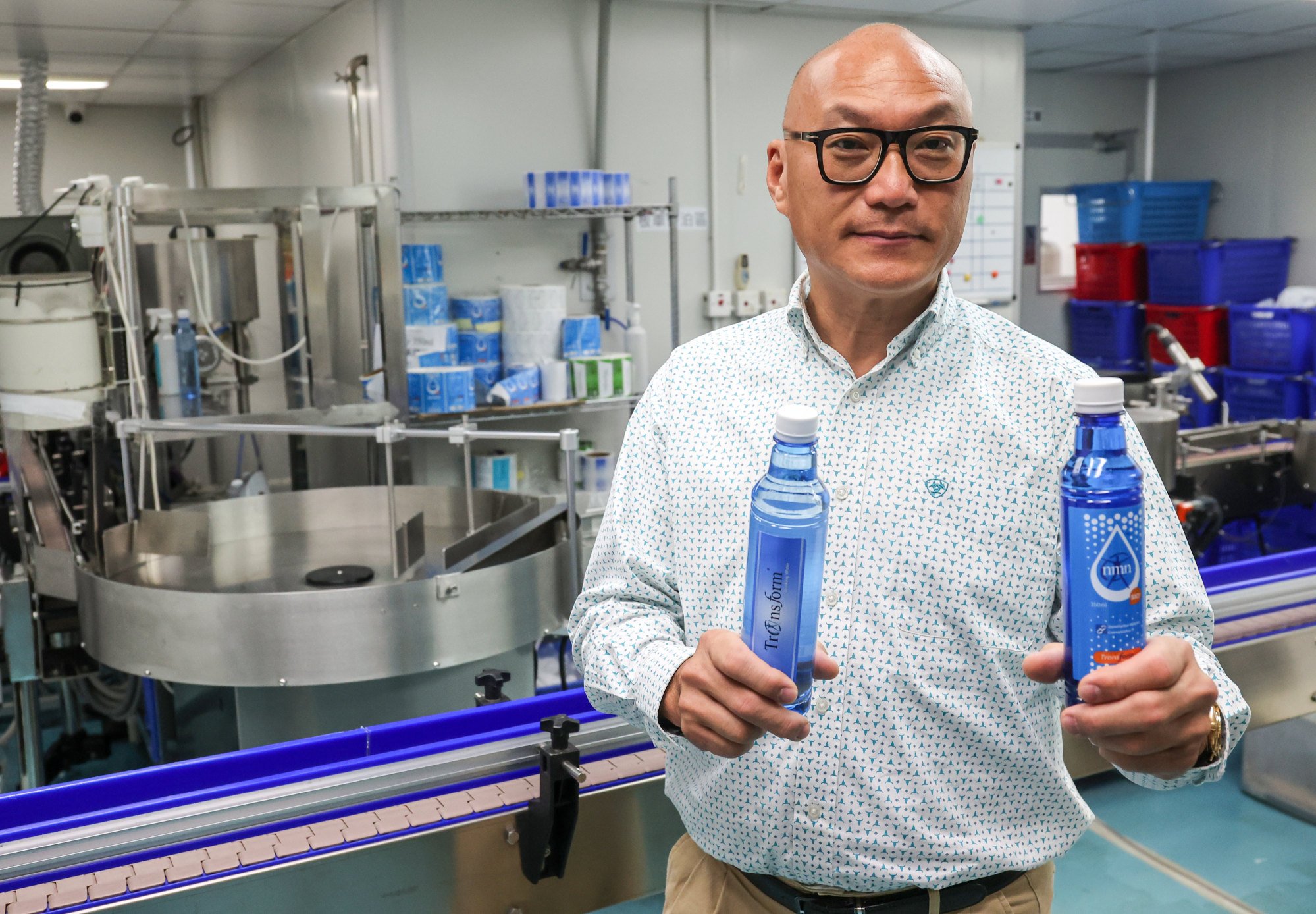
Zing House, a Chinese restaurant in Sai Ying Pun, has added Transform’s water to its menu and business director Alice Kok Ah-sze said it believed in the product.
Aside from offering it as drinking water, the restaurant would also use it while making dim sum.
“We think the product is a lot more purified than tap water and it’s all about bringing a new experience to our diners as a gimmick,” she said.
A look at Hong Kong’s response to the Fukushima waste water discharge plan
His company saw a surge in customers switching from fish oil supplements to algae-based products even when the fish-based goods did not use any Japanese raw materials.
“Food safety is more of a confidence issue. We did not source Japanese raw materials in our fish oil products but consumers were asking about the origins before buying,” he said. “We’re also making an effort to ease their anxiety by telling them the origins of other products.”
He received a HK$7.9 million government subsidy, but expected production costs to rise because the prices of raw materials sourced from Europe and the United States for fish oil supplements had shot up over the past month.
“Our production line is equipped with advanced technology to monitor every aspect of the process and keep it contamination free, but customers want to be assured of safety. We may have to pay more for product checks in the future,” said Chan, who is also vice-president of the Chinese Manufacturers’ Association of Hong Kong.

